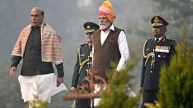SC Judgement on Demonetisation: The Central Government’s decision to demonetize the Rs. 500 and Rs. 1000 currency notes in 2016 was upheld by the Supreme Court on Monday.
A five-judge Constitution panel dismissed a number of petitions opposing the Centre’s 2016 decision to demonetize the Rs. 500 and Rs. 1000 notes, stating that the Executive’s economic strategy precludes the decision’s being overturned. Bench of the Supreme Court said: “Before demonetization, there were discussions between the RBI and the Center. There was a valid rationale for bringing such a measure, and we maintain that demonetisation did not violate the doctrine of proportionality.”
Read More :-PM MODI TO ADDRESS 108TH INDIAN SCIENCE CONGRESS ON TUESDAY
On December 7, the supreme court reserved decisions on the 58 petitions.
It had earlier requested that records related to the 2016 demonetisation decision be brought before it in a sealed envelope by the Centre and the Reserve Bank of India.
The judiciary “cannot fold its hands and sit just because it is an economic policy decision,” it had added, adding that it had the authority to look into how the decision to demonetize was made.
When the Reserve Bank of India’s attorney argued that judicial review cannot be used to determine economic policy, the highest court made its comments.
The aim of the demonetization strategy, according to the RBI, was to combat counterfeit money and black market transactions.
According to Attorney General R. Venkatramani, the economic policy of demonetisation was linked to a social policy that tried to address three evils.
Attorney General R. Venkataramani, the RBI’s attorney, and the petitioners’ attorneys, including prominent attorneys P. Chidambaram and Shyam Divan, presented their cases.
Read More :-ANIL LAHOTI TAKES CHARGE AS CHAIRMAN & CEO, RAILWAY BOARD
Chidambaram had claimed that the government cannot on its own launch any proposal relating to legal tender, which can only be done on the suggestion of the RBI’s central board. He had called the elimination of the Rs. 500 and Rs. 1,000 currency notes extremely defective.
Read More :- Latest India News










